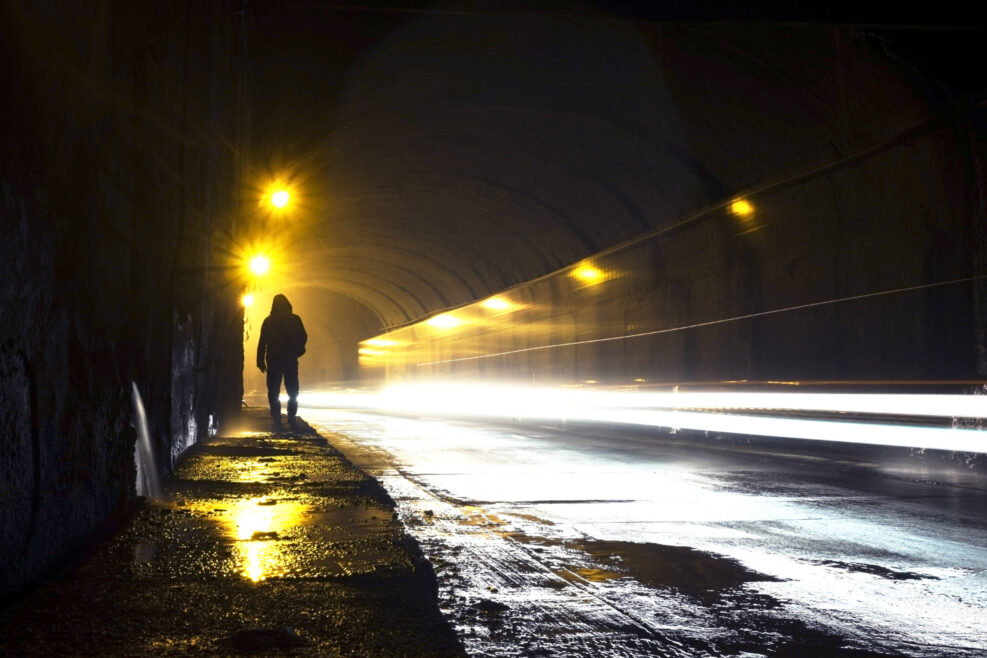
TagNear-death experiences


One Reason Why Near-Death Experiences Are Difficult to Study
Philosopher Bernardo Kastrup talks at Closer to Truth about the problem of trying to communicate experiences for which there are no words
Brain Surgeon Shows Why AI Can Never Become Human
Spoiler alert: AI requires physical hardware; the mind does not
A Neurosurgeon Weighs in On Near-Death Experiences
On this episode of Mind Matters News, host Robert J. Marks concludes his four-part conversation with neurosurgeon Dr. Michael Egnor about his new book The Immortal Mind. In this final segment, the evidence for the reality of near-death experiences (NDEs) is examined, including well-documented cases such as that of Pam Reynolds, whose NDE occurred during a highly-monitored neurosurgical procedure. Marks Read More ›

The Immortal Mind: An Interview with Neurosurgeon Dr. Michael
Is the mind more than the brain? Is there a scientific case for the existence of the soul? On this episode, host Dr. Robert J. Marks speaks with neurosurgeon Dr. Michael Egnor about his new book The Immortal Mind: A Neurosurgeon’s Case for the Existence of the Soul. Dr. Egnor is an experienced brain surgeon who previously held materialist views but Read More ›

Are Near-Death Experiences Just Another Branch of Research Now?
We should hope so because there are a number of interesting allied research areas that would be better studied without preexisting prejudice against NDEs
Gary Habermas on Near-Death Experiences
What is the evidence and how many reports of this phenomenon do we have?
Gary Habermas on the Scientific Evidence for Near-Death Experiences
Is there strong scientific evidence for near-death experiences? On this episode of Mind Matters, we’re happy to share host Andrew McDiarmid’s recent ID The Future conversation with Dr. Gary Habermas about his chapter evaluating the evidence for near-death experiences in the recent book Minding the Brain. As Dr. Habermas explains, most near-death accounts contain both objective and subjective elements. While personal testimony about other Read More ›

Yes, the Film on Near-Death Experiences Is Another “Hated Hit”
As with Sound of Freedom, critics trashed After Death but audiences loved it. And the critics just aren’t keeping up with the science
Near-Death Experience Study: Brain Is Active After Death
Science media are making surprisingly few efforts to attack or explain away the team’s findings
Physicist: Life After Death Is Incompatible With Physics
In 2011, Sean Carroll wrote an essay for Scientific American on why — from a science perspective — our minds must be extinguished at deathBack in 2011, particle physicist Sean M. Carroll wrote a guest blog at Scientific American, dismissing the idea of life after death or the immortality of the soul. He began by responding to astrophysicist Adam Frank’s reflections at NPR: For myself I remain fully and firmly agnostic on the question. If ever there was a place where firm convictions seem misplaced this is it. There simply is no controlled, experimental verifiable information to support either the “you rot” vs. “you go on” positions. In the absence of said information we are all free to believe as we like but, I would argue, it behooves us to remember that truly “public” knowledge on the subject — the kind science exemplifies — Read More ›

Study: 1 in 5 Cardiac Patients May Have Near-Death Experience
The researchers found spikes of brain activity, including so-called gamma, delta, theta, alpha, and beta waves up to an hour into CPRRecent research shows that one in five people who survive cardiopulmonary resuscitation (CPR) after a heart attack ‘may describe lucid experiences of death that occurred while they were seemingly unconscious and on the brink of death”: Led by researchers at NYU Grossman School of Medicine and elsewhere, the study involved 567 men and women whose hearts stopped beating while hospitalized and who received CPR between May 2017 and March 2020 in the United States and United Kingdom. Despite immediate treatment, fewer than 10% recovered sufficiently to be discharged from hospital. Survivors reported having unique lucid experiences, including a perception of separation from the body, observing events without pain or distress, and a meaningful evaluation of life, including of their actions, Read More ›

Remember When Near-Death Experiencers Were Mental Cases?
Scientists “knew” it wasn’t true. Then modern medicine started bringing people back from the dead…Here’s ScienceDaily’s writeup of the near-death experiences paper published at the New York Academy of Sciences. It didn’t used to be the case that near-death experiences got written up anywhere except in a psychiatrist’s notebook. Something is changing: “Cardiac arrest is not a heart attack, but represents the final stage of a disease or event that causes a person to die,” lead author Parnia explains. “The advent of cardiopulmonary resuscitation (CPR) showed us that death is not an absolute state, rather, it’s a process that could potentially be reversed in some people even after it has started. “What has enabled the scientific study of death,” he continues, “is that brain cells do not become irreversibly damaged within minutes of oxygen Read More ›

Neuroscientists: Near-death perceptions not just hallucinations
Published in the Annals of the New York Academy of SciencesOne of the authors, Sam Parnia is a well-known researcher in this area: Due to advances in resuscitation and critical care, many people are surviving near-death experiences. Survivors’ recalled experiences are not consistent with hallucinations, but instead, follow a specific narrative arc involving perception. Scientific advances in the 20th and 21st centuries have led to a major evolution in the understanding of death. At the same time, for decades, people who have survived an encounter with death have recalled unexplained lucid episodes involving heightened consciousness and awareness. These have been reported using the popular—yet scientifically ill-defined—term “near-death experiences”. A multidisciplinary team of national and international leaders, led by Sam Parnia, MD, Ph.D., director of Critical Care and Resuscitation Research at Read More ›

Neuroscience, Quantum Physics, and the Nature of Reality
Dr. Michael Egnor and Dr. Bruce Gordon discuss quantum mechanics, the nature of reality, idealism and how to interpret the finding of modern neuroscience. Prepare to cover a lot of ground on this Mind Matter News Bingecast. Show Notes 00:00:43 | Introducing Dr. Bruce Gordon 00:02:00 | Idealism 00:03:37 | Plato’s theory of forms 00:05:08 | Kantian idealism 00:09:17 | Read More ›

Do Only Western Religious People Have Near-Death Experiences?
Even famous atheist philosopher A. J. Ayer had a near-death experienceGregory Shushan, author of Near-Death Experience in Indigenous Religions (2018) notes in a recent article at Psyche that near-death experiences are not a new discovery: NDEs have been popularly recognised in the West since the mid-1970s, but people from the largest empires to the smallest hunter-gatherer societies have been having them throughout history. Accounts are found in ancient sacred texts, historical documents, the journals of explorers and missionaries, and the ethnographic reports of anthropologists. Among the hundreds I’ve collected are those of a 7th-century BCE Chinese provincial ruler, a 4th-century BCE Greek soldier, a 12th-century Belgian saint, a 15th-century Mexica princess, an 18th-century British admiral, a 19th-century Ghanaian victim of human sacrifice, and a Soviet man who’d apparently killed himself Read More ›

Dr. Angus Menuge: The Mind-Body Problem (Part I)
The mind-body problem is much like the chicken-and-egg dilemma: Which came first? In today’s episode, Dr. Robert J. Marks sits down with Dr. Angus Menuge to discuss the basics of the mind-body problem, its philosophical history, and whether artificial intelligence ever has a chance at truly replicating the human mind. Show Notes Additional Resources

Bruce Gordon on the Meaning of Neuroscience (Part III)
In this third and final episode with Dr. Bruce Gordon, host Michael Egnor picks Gordon’s brain on the overlaps between historical metaphysical perspectives and modern neuroscience. What does St. Thomas Aquinas have to say about metaphysical realities, and how does that compare to Plato’s idealism? Who is right? And what can near-death experiences and other phenomena tell us about the Read More ›

Does Freezing the Brain’s “Connectome” Offer Hope of Immortality?
Some cryogenics researchers are looking at methods of freezing the brain’s memory apparatus in the hope of reviving it one day and saving it as an artificial intelligence
The MD Who Studies Near Death Experiences Is NOT Religious
Greyson was motivated by a desire to understand experiences that materialist approaches have simply not explained satisfactorilyLast week, we talked about psychiatrist Bruce Greyson and his new book, After (2021), discussing near-death experiences (NDEs). The Guardian ran an interview with Greyson the same day, in which he offers some perspectives that may be useful in trying to sort out the issues: ● Modern neuroscience does not have a simple answer that dismisses NDEs. When I ask Greyson why he decided to publish After now, after all these years, he explains that “we had to wait until we had enough knowledge about near-death experiences to be able to understand what was going on,” by which he means not that we know what NDEs are, but that advances in science have allowed us to rule out a heap Read More ›